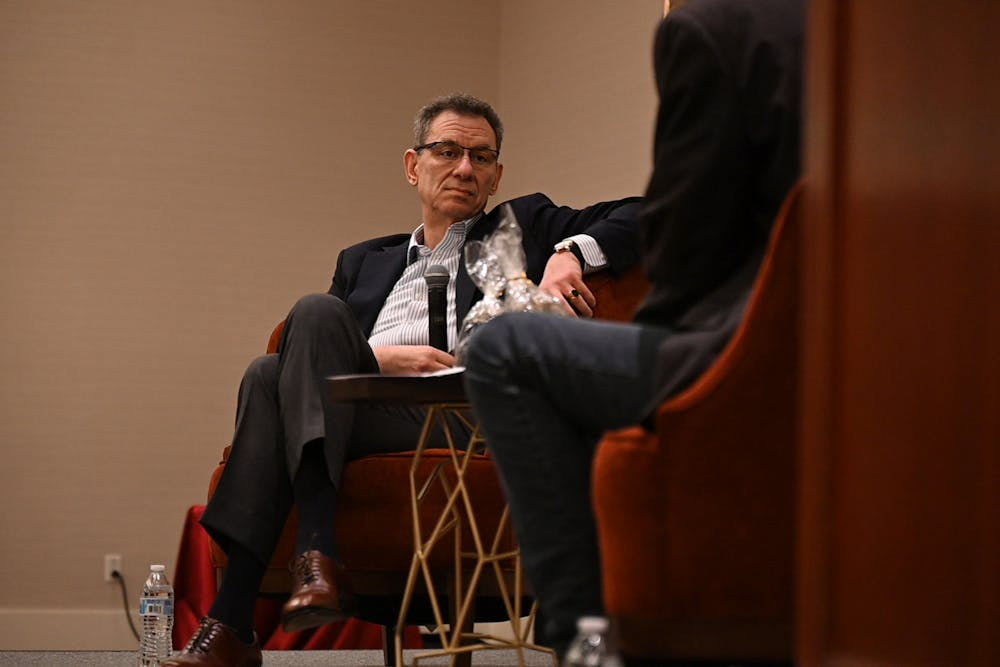The Wharton Undergraduate Healthcare Club held its 11th annual conference on Feb. 10, featuring Pfizer CEO and Chairman Albert Bourla; Regeneron Co-Founder, President, and Chief Scientific Officer George Yancopoulos; and other industry leaders as guest speakers.
The day-long conference, titled “Healthcare at a Crossroads,” consisted of panelist discussions on the intersections between health care and various fields — such as health care policy, medical AI advancements, innovation and accessibility, and entrepreneurial biotech start-ups. The event concluded with a career fair, where students networked with representatives from Pfizer, Deloitte, and Boston Consulting Group, among others.
Om Gandhi, Engineering and College junior and WUHC co-president, said that the conference aimed to inspire students to make impacts in health care by utilizing their unique backgrounds.
College and Wharton sophomore Corey He, who organized the conference, said that participation of the panelists and industry guests was made possible by the LSM Advisory Board network, Penn Medicine network, and Penn alumni base.
The conference included two “fireside chats” with Bourla and Yancopoulos.

School of Veterinary Medicine Dean Andrew Hoffman speaks to undergraduates attending the Wharton Undergraduate Healthcare Conference lunch on Feb. 10.
Director of the Vagelos Life Sciences & Management Program Philip Rea moderated the discussion with Bourla, who noted Pfizer’s focus on mRNA technology approaches. These techniques, which served as the basis for the Pfizer/BioNTech COVID-19 vaccine, were primarily based on research conducted by 2023 Nobel Prize in Medicine laureates and Penn Medicine researchers Katalin Karikó and Drew Weissman.
Bourla also emphasized the importance of optimism as a social and political skill and its necessity in business leadership, especially during the pandemic. He concluded his remarks with advice for students on how he navigated his 30-year career path in pharmaceuticals.
RELATED:
New student initiative at Penn partners with startup specializing in AI healthcare applications
Penn Medicine faculty present pioneering advances in cardiology at annual AHA conference
"There is not one requirement that makes someone successful. But there is one common element that I’ve seen in all talked-about successful people. This is that they all love what they do,” Bourla said. “I have seen people do what they love and be successful, but never someone who doesn't like it and is successful.”
Presidential Assistant Professor at Penn Medicine Institute for Immunology Kellie Jurado moderated the conversation with Yancopoulos, who focused on preparing students for the mindset needed to advance science research.
“You question everything. In every great discovery, in order to do something different, you have to reject what everybody believes," Yancopoulos said. "If you want to do something different, that means you have an idea that probably goes against what everybody else believes."
The conference also included four panels which discussed some of the greatest challenges for those entering the health care industry, as opposed to the traditional medicinal pathway.
During a panel about AI in health care, General Manager of AI Applications at Tempus Labs Chris Scotto DiVetta talked about the importance of having “a high pain tolerance” when entering the health care industry. He said that developing life-saving treatments and important technologies takes “a lot of time and a lot of thoughtful red tape.”
“It’s not a fast game, but it’s very purposeful work,” DiVetta said.
AI is quickly becoming an emerging topic in health care, with applications in the streamlining of diagnoses and patient data and the automation of remote procedures. Penn recently became the first Ivy League university to offer a bachelor's degree in AI — which includes a concentration in health/systems.

Co-Founder, President, and Chief Scientific Officer of Regeneron George Yancopoulos participated in a fireside chat at the Wharton Undergraduate Healthcare Conference this past Saturday.
Many of the panelists referenced their unique backgrounds in approaching new ventures in health care.
During another panel about politics and health providers, Chief Legal Officer and Corporate Secretary at Moderna Shannon Thyme Klinger said that holding a law degree enabled her to think critically and communicate articulately in the bioethics advocacy field.
Yancopoulos ended his talk with similar sentiments, saying that students have the power to change things that they were powerless to challenge when they were younger.
“This is why innovation is so important. Get inspired by something you want to fight back against and then figure out how to act against it, and make a difference,” Yancopoulos said.
RELATED:
New student initiative at Penn partners with startup specializing in AI healthcare applications
Penn Medicine faculty present pioneering advances in cardiology at annual AHA conference
Staff reporter Sameeksha Panda covers Penn Medicine and can be reached at panda@thedp.com. At Penn, she studies chemistry.









